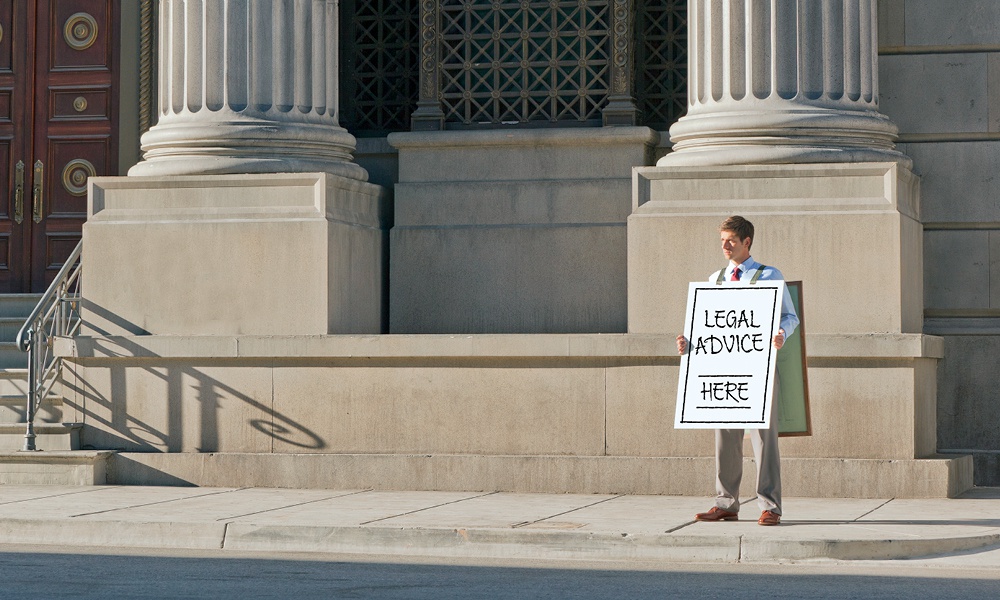There is a well-worn phrase, ‘fake it ’til you make it’.
A kind interpretation of the saying would see us believing we are forever capable of greater things, if only we would behave as if we have already arrived.
However, if a person, who is not authorised to practise law, fakes it ’til they make it, then the bad news is that they are breaking the law, as is anyone encouraging them to do so.
A recent headline in The Courier-Mail1 read: Fake lawyer in bid to be a real lawyer. The article described a young man who had, over a number of years, repeatedly held himself out to the court, clients and police as being a qualified solicitor when in fact he was not.
The law
Section 24 of the Legal Profession Act 2007 (Qld) provides, in part:2
“A person must not engage in legal practice in this jurisdiction unless the person is an Australian legal practitioner.
Penalty— 2 Definition of offence An act or omission which renders the person doing the act or making the omission liable to punishment is called an offence
Maximum penalty—300 penalty units or 2 years imprisonment.”
There are some exceptions to the above.3 Trustee companies and their employees get a leave pass:
“work performed by a trustee company, or a person employed by a trustee company, in the course of—
(i) preparing a will; or
(ii) carrying out any other activities involving the administration of trusts, the estate of a living or deceased person or the affairs of a living person;”
Further, real estate agents may complete property contracts.
It is not the purpose of this article to explore the merit of these exceptions.
Who
There are many examples of unlicensed lawyering that we all seem to turn a blind eye to from time to time.
There is the local accountant who has been seeking grants of probate and engaging in estate administration work for years.
Perhaps you have come across the local real estate agent who holds close to his heart a full commercial lease precedent that he is prepared to pump out at a moment’s notice, if only to avoid those pesky lawyers getting in the way.
And there is one of the most alarming and distressing trends, financial advisors providing extensive and complex legal advice in the shape of estate planning, including the drafting of wills and enduring powers of attorney, all with the magic touch of an online precedent provider.
Why?
Apart from the above anomalous exceptions, it does make a great deal of sense that only licensed lawyers do the lawyering. It is submitted there are a number of overarching reasons:
- legal training
- ethical standards
- regulation of lawyers.
Legal training
Nearly all lawyers undertake at least four years’ undergraduate study in the law. Then there is the practical legal training course, as well as the requirement to work under an experienced legal practitioner for a time. And it doesn’t stop there, with the requirement of a minimum number of hours each year of continuing professional development.
Ethical standards
A legal practitioner is bound by certain ethical duties. More particularly, a solicitor has:
- a paramount duty to the court and the administration of justice4
- a duty to the client5
- a duty to the profession,6 and
- a duty to the community.7
A person who is not a legal practitioner is not bound by these ethical standards.
Regulation
In Queensland the conduct of a legal practitioner is heavily regulated. The high ethical standards and other legal requirements, so set out in the Legal Profession Act 2007, are enforced, for the greater protection of the community, the profession, the client, the court and, in a sense, the very rule of law, by:
- the court
- the Legal Services Commission
- Queensland Law Society
- public opinion.
Unlicensed lawyering means uninsured lawyering
It is a legal requirement of practising law to hold certain professional indemnity insurance. Therefore, there is the added protection for the community, that if a lawyer is found to be negligent, the payment of such claim can be underwritten by the lawyer’s insurance.
It would be difficult to imagine that those who undertaken the illegal practice of law could essentially secure such coverage (and they are not bound to do so, even if they could). Thus, where non-lawyers engage in legal practice and are negligent, members of the community, including beneficiaries of estates, will be left with legal rights but little prospect of securing their enforcement.
Don’t encourage others to break the law
Section 23 of the South Australian Legal Practitioners Act 1981 provides in part:8
“If a legal practitioner—
(a) permits or aids an unqualified person to practise the profession of the law, or acts in collusion with an unqualified person so as to enable that person to practise the profession of the law
the practitioner is guilty of an offence”
Though there is no equivalent section in the Queensland Legal Profession Act 2007, one only needs to look to the Queensland Criminal Code (the Code). Section 542 of the Code provides in part:9
“Any person who conspires with another to commit any offence which is not a crime, or to do any act in any part of the world which if done in Queensland would be an offence but not a crime, and which is an offence under the laws in force in the place where it is proposed to be done, is guilty of a misdemeanour, and is liable to imprisonment for 3 years.”
- And section 2 of the Code provides a definition of the word ‘offence’:10
“An act or omission which renders the person doing the act or making the omission liable to punishment is called an offence.”
Stop
A person who is not a legal practitioner, who engages in legal practice, is breaking the law and anyone who encourages that person to do so is also breaking the law.
In the face of such concerning trends in elder financial abuse, it is submitted that it is quite unhelpful for someone, who is not a legal practitioner, to provide advice on wills and estates and other aspects of estate planning (or indeed any other legal matter).
Apart from the blatant breach of the law, such persons who lack the legal training, the ethical standards and the intense scrutiny by regulators, leave those who are most vulnerable and the broader community exposed.
With regard to the practice of law by a non-legal practitioner, I am not sure we should ‘fake it ’til we make it’,or indeed encourage anyone else to do so.
This article appears courtesy of the Queensland Law Society Succession Law Committee, which has expressed its concern over the growth in the number of unlicensed people giving legal advice. Bryan Mitchell is the Principal of Mitchells Solicitors, a QLS Accredited Specialist in succession law and the Deputy Chair of the committee.
Footnotes
1 The Courier-Mail, Saturday 21 November 2020, p28.
2 Section 24 (1) of the Legal Profession Act 2007 (Qld).
3 Ibid.
4 Australian Solicitors Conduct Rules 2012, rule 3.
5 Australian Solicitors Conduct Rules 2012, rule 4.
6 Australian Solicitors Conduct Rules 2012, rule 5.
7 Australian Solicitors Conduct Rules 2012, rule 5.
8 Section 23(3) of the Legal Practitioners Act 1981(SA).
9 Section 542(1) Criminal Code Act 1899 (Qld).
10 Section 2 Criminal Code Act 1899 (Qld).














Share this article